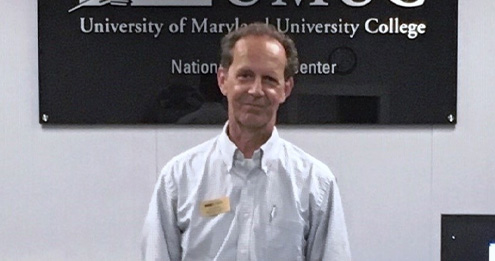- Veteran
- Test Center Administration
- Air Force
Certification Spotlight
Credentialing success from the Service community
How one retired Air Force Master Sergeant influences future Airmen through certification
Jose Mobley, Retired Air Force Master Sergeant
Industry credentials have the power to impact careers both while serving as well as after separation. In partnership with the Department of Defense and various academic institutions, Pearson VUE delivers credentials that help the Service member community earn recognition for their experiences and expertise. Retired Master Sergeant Jose Mobley, USAF, shares his perspective on the importance of credentialing for Service communities as he actively manages the test center at Eglin AFB in Florida.

Jose Mobley, Retired Air Force Master Sergeant
What was your role in the Air Force?
I was in the Air Force for 23 years and retired as a Master Sergeant (E7). My last position was as a Support Flight Superintendent for the 65th Communications Squadron at Lajes Air Base in the Azores islands (Portugal) from 2002 – 2004.
What work did you transition to after your time in the military?
I worked for the state of Florida for seven years as an employment counselor for military families. I also worked at My Career Advancement Account (MyCAA) for military spouses. In this work, I helped people recertify when they moved to a new place. This role served as a continued link to the military while also introducing me to the power of certification.
In 2012, I started working as a Test Administrator for UMUC National Testing at Eglin AFB in Florida. Drawing on my 23 years of experience in the Air Force, this work allows me to continue to support and connect with Service members and military spouses, and it’s so rewarding to help them on their professional and educational journeys. I truly enjoy working with our military and civilian community at Eglin and adjacent bases that use our NTC to take their certification exams.
How do Airmen know about the certification options available to them?
The Eglin Education Office does a great job marketing available certifications to our Airmen, and they make sure to educate any newcomers about certification opportunities. We provide weekly briefings on the Credentialing Opportunities On-Line (COOL) program to educate Airmen on how they can get funding to obtain certifications that correlate with their specific Air Force Specialty Code.
Our military members are wonderful testers because of the discipline they received from their training.
We provide testing information on a weekly basis through the Base Official Bulletin, which is a base-wide electronic communication that reaches everyone. We also receive support from the excellent partnership between the base, UMUC, and corporate partners like Pearson VUE that support the test center on base.
What excites you about your daily work at the test center?
The Airmen showing up to test are really pushing themselves to advance in their careers. It’s really motivating to see the ambition in these young men and women in the military, especially at junior ranks, because they’re excited about their futures.
How does the test center itself contribute to an Airman’s certification experience?
I work hard to make sure the test center runs smoothly and that the conditions are just right to put the Airmen in a position to succeed — that’s my contribution to their success. Our test center has grown in our ability to provide an extremely smooth testing experience, and that’s in large part due to the counselors, education services staff, and ESO with whom we have great rapport. In general, though, our military members are wonderful testers because of the discipline they received from their training.
Over the course of your career, have you seen any changes in the way that certifications are viewed in the DoD?
I have seen a great increase in demand from both the military and the private sector in requiring credentials and certifications for current military occupations. For example, DoD Directive 8570 has played a big role in the increased demand for cyber security certifications.
It’s really motivating to see the ambition in these young men and women in the military, especially at junior ranks, because they’re excited about their futures.
The same goes for our transitioning Airmen, as well. They know that, while having a degree is important, the employers are really looking at their experience and certifications, too. There are many positions in private industry where a certification is required to meet the entry job specification or for continuous progress in their careers.
What level of growth in certification activity have you seen specifically at your test center?
From a test delivery perspective, I expect the industry to continue to grow rapidly, especially with the recertification needed to keep up with innovations in the IT field, specifically in cloud technology tracks from CompTIA or Cisco.
In 2012 - 2013 when we started, 5.4% of our testing was from certification programs delivered through Pearson VUE. The next year, we increased that number by 12%, and by the 2015- 2016 academic year, 33% of all of our testing came from certification programs delivered through Pearson VUE. The demand for certifications has clearly accelerated, and it’s only going to continue in the years ahead!
Have you heard from any former Airmen who have mentioned the importance that certifications have had on their careers?
There was one contractor I called “the Cisco kid” because he came in for so many Cisco certifications. One day, he came in and said, “I got a promotion because of the certifications I’ve earned.” He was thrilled that all of his hard work had paid off, and we were thrilled that we got to be part of his journey.
